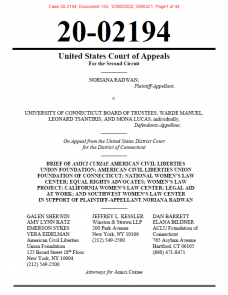Abortion rights, women of color, and LGBTQIA+ people are under attack. Pledge to join us in fighting for gender justice.

 On Dec. 8, 2020, NWLC joined an amicus brief led by the ACLU Foundation on behalf of civil rights groups in the case Radwan v. University of Connecticut Board of Trustees. The groups asked the 2nd Circuit to reverse the district court’s decision, which held that there was no genuine issue of fact about whether the university’s treatment of a female athlete constituted sex discrimination under Title IX. The female athlete was thrown off her team and lost her scholarship for raising her middle finger in a celebratory gesture after her team’s win in a tournament championship, whereas male athletes at UConn have engaged in worse conduct, including criminal conduct, with virtually no disciplinary consequences. The brief urges the court to overturn the district court’s rigid requirement that a Title IX plaintiff challenging the imposition of discipline must provide evidence of a specific male comparator, disciplined for virtually the same conduct, by the same decisionmaker. Such a rule would undermine Title IX protections in athletics, where male and female athletes typically have different coaches, and more broadly, it could create perverse incentives for schools to insulate themselves from Title IX liability by separating the supervision of female and male students.
On Dec. 8, 2020, NWLC joined an amicus brief led by the ACLU Foundation on behalf of civil rights groups in the case Radwan v. University of Connecticut Board of Trustees. The groups asked the 2nd Circuit to reverse the district court’s decision, which held that there was no genuine issue of fact about whether the university’s treatment of a female athlete constituted sex discrimination under Title IX. The female athlete was thrown off her team and lost her scholarship for raising her middle finger in a celebratory gesture after her team’s win in a tournament championship, whereas male athletes at UConn have engaged in worse conduct, including criminal conduct, with virtually no disciplinary consequences. The brief urges the court to overturn the district court’s rigid requirement that a Title IX plaintiff challenging the imposition of discipline must provide evidence of a specific male comparator, disciplined for virtually the same conduct, by the same decisionmaker. Such a rule would undermine Title IX protections in athletics, where male and female athletes typically have different coaches, and more broadly, it could create perverse incentives for schools to insulate themselves from Title IX liability by separating the supervision of female and male students.
*** Victory! Update! *** On November 30, 2022, the Second Circuit held that student-athlete Noriana Radwan can go to trial on her Title IX claim that she was disciplined unfairly based on sex. While the Court affirmed the lower court’s dismissal of her other claims based on immunity, the court decided that her Title IX claim should go forward. In the decision, the Court provided favorable analysis as to the “same decisionmaker” and “comparator” requirements that are part of bringing Title IX discrimination claims. Specifically, the Court noted that women’s and men’s athletics teams are usually led by different coaches, and that it would be unreasonable to require students to provide evidence of a specific male comparator, disciplined for virtually the same conduct, by the same decisionmaker. It was sufficient that Noriana provided evidence showing her athletic director never permanently removed a male student-athlete from his team or revoked his scholarship for a first instance of unsportsmanlike conduct. This case is an important victory for Noriana and other students who now may be more likely to benefit from the protections of Title IX.
